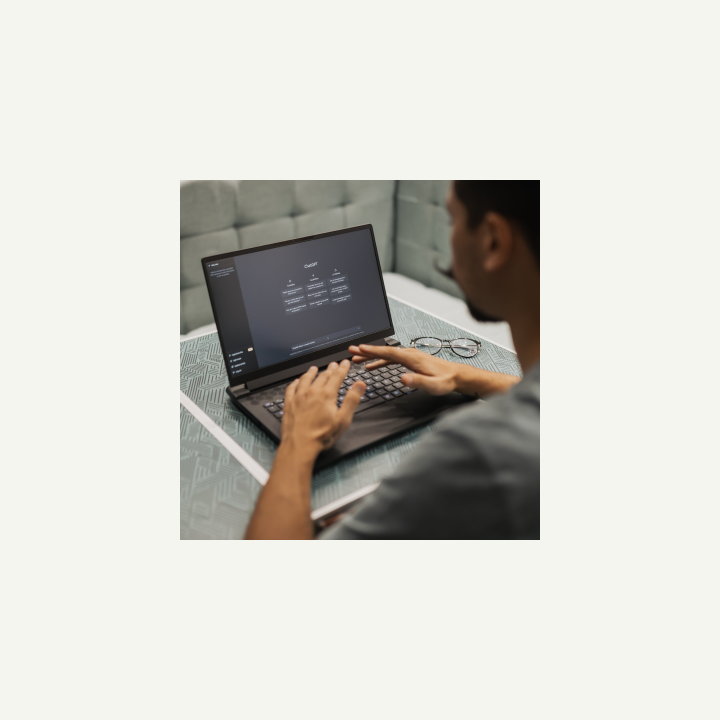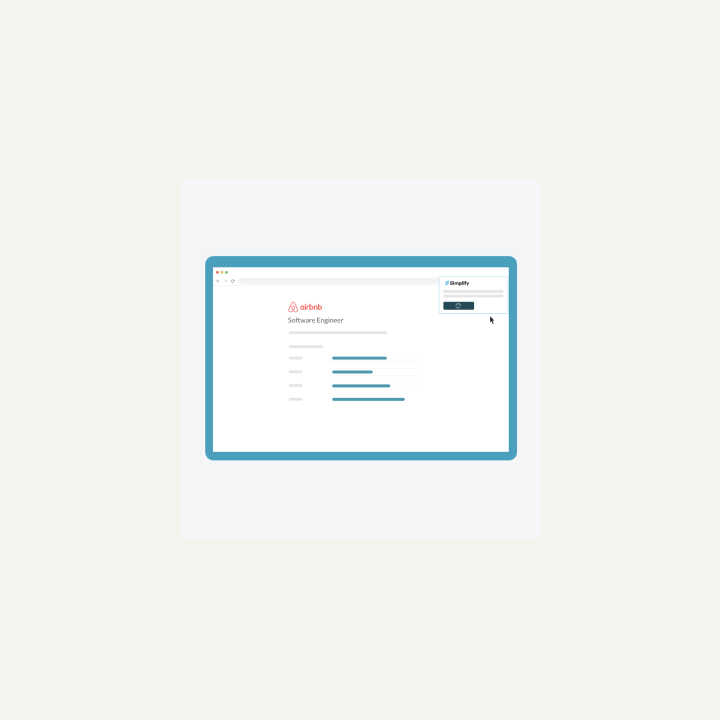7 Ways to Use AI in Your Job Search

It wasn’t long ago that artificial intelligence (AI) sounded like something out of a futuristic movie. But fast forward to 2023 and it feels like AI is the talk of the town.
With AI technology getting more impressive by the day, many of us find ourselves wondering if AI is coming for our jobs. (Read: “Will AI be the end of data analysts?”)
While AI is certainly shaking up the job market, it’s not what you think. AI might actually just be the tool to give you a leg up in your next job search.
The AI Job Search Edge in Today’s Competitive Job Market
The job market—especially in the tech industry—has been particularly rocky over the last few years. We’ve seen pandemic-driven hiring sprees to major tech layoffs and everything in between. But as we emerge into the future of work, there are still thousands of open roles out there waiting for the right candidate. The difference is that now AI can help you find and land those roles.
Over the last year, generative AI—the kind that creates content—has taken off by storm thanks to Open AI’s ChatGPT. But for most of us, the use of AI still feels relatively new. So if you’ve never used AI, it can feel overwhelming or even a bit like cheating.
But here’s the thing: AI is quickly becoming the new normal and knowing how to use it to your advantage is going to give you a competitive edge.
Marti Konstant, a workforce and career agility trainer said it best in this Forbes article, “Use AI as your personal genius bar and you will not lose jobs to robots. You will only lose out to those who embrace AI.”
According to a ResumeBuilder.com survey, over 59% of job seekers are getting hired after using resumes and cover letters written by ChatGPT. And this is just the beginning. Gartner predicts that by 2025, half of all knowledge workers will use some sort of virtual assistant. So while using AI to support your career can still feel somewhat a bit taboo right now, there’s no denying that AI is the future of work.
Now, AI can’t and won’t replace the unique skills and experience you offer. But what you can do is leverage its capabilities to make you faster and more efficient in your job search, so you can submit stronger applications that stand out from the crowd.
And here’s how.
7 Ways AI Can Help You in Your Job Search
Realistically, the use cases for AI in your job search are only limited by how creative you want to be.
But here are some ways you can make AI work for you as you navigate the hiring process.

1. Use an AI Resume Creator
According to the Wall Street Journal, your resume has six seconds to capture the attention of the recruiter or hiring manager. That’s a lot of pressure to put on a one to two-page document.
The right resume headlines, sections, and bullet points can help you make the most of those six seconds. Generative AI is the key to helping you find the right words without having to rewrite the same bullet point six ways to Sunday.
Here’s an example of a ChatGPT prompt to help you craft a bullet in your resume:
“I’m applying for my first job as a software developer. Please write me a bullet point for my resume that indicates that I completed a project where I coded a fully useable app from scratch for iOS using Javascript”
Here’s what ChatGPT suggested:‘Developed a fully functional iOS app using JavaScript from scratch, demonstrating proficiency in coding, problem-solving, and mobile application development.”
But when it comes to AI and resumes, it’s not just ChatGPT that’s making waves. AI resume writers like Rezi and KickResume can help you create resumes from start to finish with as little information as a job title. And keyword scanners like Skillsyncer can match the skills and keywords in your resume with the job description to help you score an interview.

2. Level Up Your Cover Letter with AI
Depending on which job search rabbit hole you find yourself down, you might hear rumors that the cover letter is dead. But in many industries and many positions, a cover letter will still help you stand out from the crowd.
Cover letters can also be a powerful tool for sharing your personal journey. Is there something that connects you to the brand you’re applying to? Or maybe you’ve recently ventured down a new career path. Your cover letter can paint a picture of you that goes beyond just your previous roles and responsibilities.
But writing and storytelling don’t come naturally to everyone, so leave the tough sentences up to AI instead. Simply share some key pieces of information you want to convey in your cover letter with a generative AI, like ChatGPT, and watch your cover letter come to life.
Here’s an idea for a Chat GPT cover letter prompt:
“Please write me a short cover letter for a data analyst position at Company ABC. I’d like to highlight the following points:
- I recently switched careers because I’m interested in the future of big data.
- I have developed extensive hands-on analytic skills in an online training program”.
3. Make a Better First Impression with an AI LinkedIn Optimizer
LinkedIn has been using AI to match your profile to potential jobs and connections for years. But now you can harness the power of AI to level up your own LinkedIn profile.
LinkedIn is like a cross between a social media platform and a digital resume. As one of the biggest professional networking tools in the world, a solid LinkedIn profile can help you with networking or even enhancing your job applications. Hundreds of jobs are listed on LinkedIn’s job board every day and even external applications will often ask you to link your LinkedIn profile.
Creating an effective LinkedIn profile isn’t quite as complicated as learning the latest TikTok trends. But from job summaries to profile headers, there’s a bit more to LinkedIn than highlighting your latest job title.
If you’re finding yourself stuck crafting new content for LinkedIn, prompt ChatGPT to help you write your headline or use a Chrome extension like Careerflow.ai to rewrite your profile based on your career goals.
Need an updated headshot? AI can help with that too. Software solutions, like AI Suitup, have been gaining traction for taking everyday photos and transforming them into affordable and professional headshots.
4. Tap into AI for Interview Practice
You can also use AI to improve your interview answers. If you’re not sure how to best answer a question, prompt ChatGPT to offer a different perspective on your experience and provide alternative ways to frame your experience in an interview.
Practice is undoubtedly one of the best ways to nail your next interview. But with AI, you can do better than simply talking to yourself in the mirror.
Use generative AI, like ChatGPT, to help you surface potential interview questions based on a job description. This way you won’t find yourself caught off guard when interview day rolls around.
Here’s an example of a prompt you can use:
“I have an interview tomorrow for a Data Analyst role. After my request, I am going to provide details from the job posting. Can you please provide a list of potential questions I might be asked during my interview?”
Then just copy and paste in the job description for a list of questions that you can use as a starting point for interview prep.
LinkedIn now even offers AI-powered interview feedback to help you with delivery of your interview answers.
But remember, you shouldn’t be memorizing answers for your interview. The goal of interview prep is to have key points top of mind, so you can give an answer that feels seamless yet authentically you.
5. Let AI Connect you with the Right Roles
While you’re freshening up your resume or practicing your interview skills, there’s another key step to landing your next job—finding the right role.
You can always take the old-fashioned approach of combing through different job boards. But why do that when you can cut your search time in half by using AI?
AI can use machine learning to connect you with the roles that would be the best fit for your skills and experience. Many recruiters and talent teams are already leveraging some form of AI in the talent acquisition process, but the rise of AI has made these tools more accessible to job seekers as well.
Resources like Talentprise or Kickresume’s Pyjama Jobs will scan your resume and match you with roles at top companies like Amazon and Dropbox that you may not have found otherwise.

6. Write Better Emails with AI
We all know how to write emails. But in the job search process, the stakes of every email just feel a little bit higher.
Whether you’re writing a cold email to get the attention of recruiters at your favorite tech companies or just following up on your latest interview, there are a lot of email exchanges in the job search process.
Use AI, like ChatGPT, to help you draft and reword your emails so you can send personalized emails quickly and flawlessly every time.
Sending out multiple cold job search emails? Try GPT for Sheets to customize your communications right within your Google documents and keep your outreach organized.
AI can even support your communications at the job offer stage. Job seekers have asked ChatGPT to help them negotiate a better salary and even top industry experts have given ChatGPT’s scripts and steps for negotiating a raise their stamp of approval.
7. Automate Your Job Application Process with AI
Applying for a new job is a full-time job in itself. And if you’re currently working, a job search can be an even bigger commitment.
But that doesn’t mean you need to give up on your job search either. Use machine learning and AI tools to streamline the application process, so you can apply for more jobs in less time.
Here are some ways you can use automation and AI tools to operationalize your job search:
- Automatically apply to jobs: AI-powered software like Sonara can take your resume and automatically match it to millions of jobs and submit applications on your behalf—without you having to lift a finger.
- Fill out applications in a few clicks: Instead of filling out every job application manually, Simplify Copilot is a Chrome extension that will help automatically fill out your applications based on your profile.
- Track your job applications: It can take dozens of applications to find the right role for you, but keeping track of it all can be tricky. Careerflow.ai also has an application tracker tool to help you track your applications and interviews.

Stand Out with AI in Your Job Search
AI is no longer just a thing of the future. So make the most of it to get one step closer to your dream career.
But when it comes to landing your next job, AI isn’t the be-all-end-all. You’re still going to need to bring your own skills, education, and unique perspectives to the table. While AI is a great resource to help you craft a stronger application, there’s only one you and that’s something AI can’t replicate.
And if you need a little extra motivation for your job search—well, we asked AI to help with that too.







